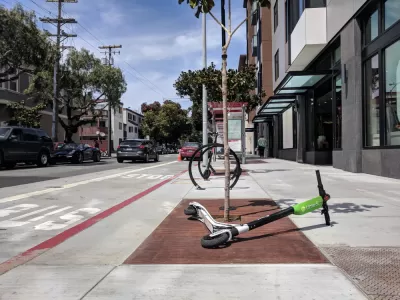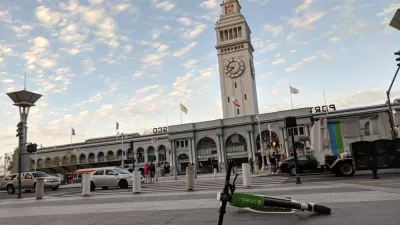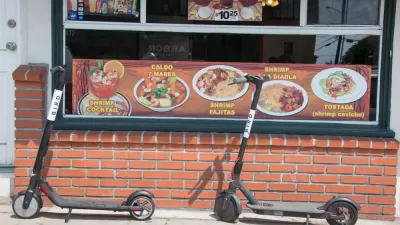Three scooter companies, Lime, Bird and Spin, removed their scooters from the sidewalks of San Francisco earlier this month and applied, with nine other companies, for five permits to operate up to 2,500 scooters in a tightly regulated pilot program.

In late March, San Mateo-based LimeBike, San Francisco-based Spin, and Santa Monica-based Bird, dropped hundreds of their electric, dockless scooters in San Francisco, setting-off the beginning of the so-called San Francisco scooter war between those who liked the new form of zero-emissions, shared-use mobility and those that saw them largely as a scourge on the sidewalks, where they are by-law prohibited from riding, and where they are often parked in a careless and sometimes hazardous manner for pedestrians.
Their soaring popularity among users, and increasing opposition by sidewalk advocates, caught the city by surprise. City officials responded in mid-April to escalating complaints by impounding improperly parked scooters, finally ordering all scooters removed this month to begin a formal application process to regulate their operation in a one-year pilot program.
In the absence of scooter-share operations in the city, the scooter war has been replaced by scooter competition among the 12 companies vying for the five permits to operate 1,250 vehicles for the first six months of the pilot, and potentially double that in the next six months.
The nine other applicants
Uber, which acquired JUMP Bikes in April, and Lyft, which is attempting to acquire Motivate, a Brooklyn-based bikesharing company, have applied. The other seven applicants are:
- Miami Beach-based CycleHop
- Beijing-based Ofo
- Cerritos (Los Angeles County)-based Razor
- San Francisco-based Ridecell, Scoot, and Skip
- El Paso-based Uscooters
What's noteworthy is that some scooter companies, such as Razor and Uscooters, are better known for selling their scooters rather than operating scooter-share programs. Others, such as Ridecell, are branching-out from carsharing and ridesharing mobility platforms.
Companies hope to distinguish their applications to impress the San Francisco Municipal Transportation Agency (SFMTA), a department of the City and County of San Francisco responsible for the management of all ground transportation in the city, which will select the winners.
"Half of the companies (Lime, Uscooters, Ofo, Bird, Ridecell, Jump) proposed requiring riders to take a photo of a properly parked scooter to complete a ride, addressing complaints about scooters left strewn on sidewalks," reports Natasha Mascarenhas for the San Francisco Chronicle on June 20. "Companies say this accountability will make users comply with parking etiquette."
CycleHop is betting on its HOPR scooter that has a port to charge smart phones and tablets.
Scoot, known for their electric mopeds that operate in the city, proposed a radical innovation: assigned parking. "The company points out that this is more environmentally friendly since it won’t have to drive trucks around picking up scooters," adds Mascarenhas. It's not clear to this correspondent whether the pilot program requires removal of scooters at night.
Bird scooter will donate $1 per vehicle for bike lane expansion and "Razor plans to give a portion of revenues from every ride to local nonprofits; however, the plan hasn’t been finalized. Skip promises to invest $1 million over two years."
Critic is pleased with competition and new regulations
"Cathy DeLuca, policy and program manager with Walk SF, said fierce competition from even more scooter companies may drive them to comply with safety concerns, DeLuca said, in a bid to win SFMTA permit approval," reported Joe Fitzgerald Rodriguez for the San Francisco Examiner on June 7.
DeLuca said one thing is certain: San Francisco would benefit from keeping the SFMTA rules that limit the number of scooters on the road, even once the pilot program is complete, based on the recent e-scooters found in trash cans, in local bodies of water, and the north of 1,800 complaints received by SFMTA.
See the source article for more ways the dozen companies hope to distinguish themselves. For a look at the financial backing of six of the scooter companies, see Fortune, May 22.
FULL STORY: S.F. scooter companies promise parking, Clipper Card use, charging and more

Planetizen Federal Action Tracker
A weekly monitor of how Trump’s orders and actions are impacting planners and planning in America.

Congressman Proposes Bill to Rename DC Metro “Trump Train”
The Make Autorail Great Again Act would withhold federal funding to the system until the Washington Metropolitan Area Transit Authority (WMATA), rebrands as the Washington Metropolitan Authority for Greater Access (WMAGA).

DARTSpace Platform Streamlines Dallas TOD Application Process
The Dallas transit agency hopes a shorter permitting timeline will boost transit-oriented development around rail stations.

Renters Now Outnumber Homeowners in Over 200 US Suburbs
High housing costs in city centers and the new-found flexibility offered by remote work are pushing more renters to suburban areas.

The Tiny, Adorable $7,000 Car Turning Japan Onto EVs
The single seat Mibot charges from a regular plug as quickly as an iPad, and is about half the price of an average EV.

Supreme Court Ruling in Pipeline Case Guts Federal Environmental Law
The decision limits the scope of a federal law that mandates extensive environmental impact reviews of energy, infrastructure, and transportation projects.
Urban Design for Planners 1: Software Tools
This six-course series explores essential urban design concepts using open source software and equips planners with the tools they need to participate fully in the urban design process.
Planning for Universal Design
Learn the tools for implementing Universal Design in planning regulations.
Municipality of Princeton
Roanoke Valley-Alleghany Regional Commission
City of Mt Shasta
City of Camden Redevelopment Agency
City of Astoria
Transportation Research & Education Center (TREC) at Portland State University
US High Speed Rail Association
City of Camden Redevelopment Agency
Municipality of Princeton (NJ)





























